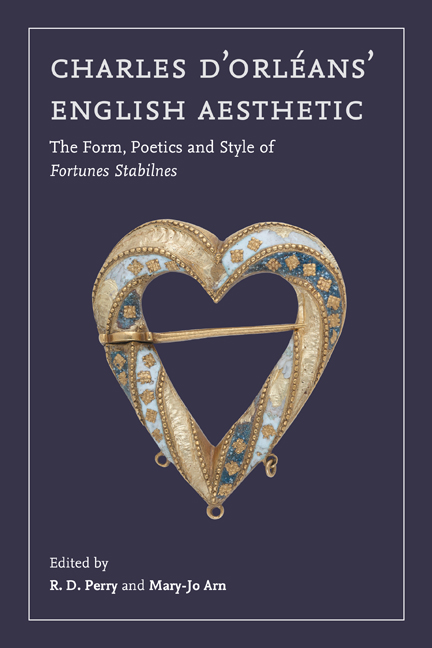Book contents
- Frontmatter
- Dedication
- Contents
- List of Illustrations
- List of Contributors
- Acknowledgements
- Abbreviations
- Introduction
- 1 The Two Dreams of Charles d’Orléans and the Structure of His English Book
- 2 Charles d’Orléans’ Cross-Channel Poetics: The Choice of Ballade Form in Fortunes Stabilnes
- 3 The English Roundel, Charles’s Jubilee, and Mimetic Form
- 4 A Grieving Lover: The Work of Mourning in Charles’s First Ballade Sequence
- 5 Charles d’Orléans’ English Metrical Phonology
- 6 The English Poetry of a Frenchman: Stress and Idiomaticity in Charles d’Orléans
- 7 Verb Use in Charles d’Orléans’ English
- 8 Charles d’Orléans and His Finding of English
- 9 Aureation as Agon: Charles d'Orléans versus John Lydgate
- 10 Charles d’Orléans, Harley 682, and the London Book-Trade
- 11 The Form of the Whole
- Select Publications, 2007–2020
- Index
4 - A Grieving Lover: The Work of Mourning in Charles’s First Ballade Sequence
Published online by Cambridge University Press: 14 October 2020
- Frontmatter
- Dedication
- Contents
- List of Illustrations
- List of Contributors
- Acknowledgements
- Abbreviations
- Introduction
- 1 The Two Dreams of Charles d’Orléans and the Structure of His English Book
- 2 Charles d’Orléans’ Cross-Channel Poetics: The Choice of Ballade Form in Fortunes Stabilnes
- 3 The English Roundel, Charles’s Jubilee, and Mimetic Form
- 4 A Grieving Lover: The Work of Mourning in Charles’s First Ballade Sequence
- 5 Charles d’Orléans’ English Metrical Phonology
- 6 The English Poetry of a Frenchman: Stress and Idiomaticity in Charles d’Orléans
- 7 Verb Use in Charles d’Orléans’ English
- 8 Charles d’Orléans and His Finding of English
- 9 Aureation as Agon: Charles d'Orléans versus John Lydgate
- 10 Charles d’Orléans, Harley 682, and the London Book-Trade
- 11 The Form of the Whole
- Select Publications, 2007–2020
- Index
Summary
Fortunes Stabilnes is an emotional poem. It is a love poem that deals with the sorrows of the courtly lover. It is also the work of a poet who experienced protracted imprisonment and exile, an ordeal that manifests itself in the poem at various levels. Borrowing tropes from the two well-established traditions, the poet frequently blurs the experiences of the lover and the prisoner, showing the former to be shackled by his devotion to the lady, the latter to be ever so often half-in-love with enclosure. But Fortunes Stabilnes is also a poem formed around death, mourning, and the considerable labour of moving beyond grief. The poetic persona's (first) beloved dies in the middle of the first ballade sequence, and the majority of the subsequent narrative is driven by, or responds in some degree to, that death. The speaker's ensuing ‘Dream of Age’ and withdrawal from his service to the God of Love are direct consequences of the sorrow he feels due to his loss. Some, though not all, of the roundels that Charles produces at the Castle of No Care deal with his grief, too. The ‘Dream of Venus’ and its inset ‘Vision of Fortune’ are both prompted by Charles's protracted mourning. Even the second ballade sequence that ostensibly chronicles his courtship of a second lady, which should be indicative of the Charles-persona having moved on, is haunted by the mourning series in the first ballade sequence.
Fortunes Stabilnes is not unique among English dream poems as a work concerned with mourning. Indeed, the insular adoption of the dream vision takes a particular interest in matters elegiac. An early Middle English dream vision, which bears the modern editorial title Somer Soneday, is intimately concerned with lamenting the death of a fallen king. The first datable dream poem written on English soil, Li regret Guillaume (c. 1339), is decidedly elegiac, having been commissioned from the court poet Jean de le Mote by Queen Philippa for her recently deceased father.Chaucer's Book of the Duchess was written to memorialise Blanche of Lancaster, wife of John of Gaunt (d. 1368).
- Type
- Chapter
- Information
- Charles d’Orléans' English AestheticThe Form, Poetics, and Style of Fortunes Stabilnes, pp. 102 - 121Publisher: Boydell & BrewerPrint publication year: 2020



